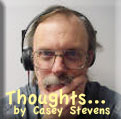- By Casey Stevens
- Opinions
 Print
Print  It appears that it may be safe to back away from contemplation of the COVID-19 disasters. I don't mean to turn our backs on it: we need to keep our antennae up, eyes open, and continue to listen to the experts. But I feel that, at least in the case of one's soul's concentration on weekly musings, that it's safe to keep one eye on the pandemic while my other eye moves on to another topic.
It appears that it may be safe to back away from contemplation of the COVID-19 disasters. I don't mean to turn our backs on it: we need to keep our antennae up, eyes open, and continue to listen to the experts. But I feel that, at least in the case of one's soul's concentration on weekly musings, that it's safe to keep one eye on the pandemic while my other eye moves on to another topic.What have you been reading these last months of lockdown? I've completed two books that I feel obliged to tell you about. Perhaps you've hears of Maus and Maus II, by Art Spiegelman. A friend of the Morning Report in years past, Daniel Schwarz of Cornell, wrote of Maus and Maus II in his excellent book, Imagining the Holocaust, but I had not picked up Maus until last month, ostensibly to understand what Professor Schwarz was talking about.
Maus and its sequel, Maus II, were incredibly successful when published. They are also incredibly unusual, done in black and white comic book format. Don't let that put you off. As Schwarz said: "I ask myself… who rarely read Doonesbury… why am I so fascinated and enthralled by Maus. What is so compelling and why do I continually reread it?" The issue, quite simple and complicated, is that Maus is about the Holocaust, or 'Shoah', as some describe it.
A cartoon strip about the Holocaust? Ah, much more than that. It is Spiegelman's effort to tell the story of the Holocaust through the eyes of a survivor of Auschwitz by his son, the cartoonist. The age-old conflict between father and son becomes immediately apparent as the son/artist documents the Oedipus-like struggle, as well as the tragedy, of the Jewish annihilation in Europe. But the real power is that these are not people. Spiegelman depicts the haunted and hunted Jews as mice, the Nazis as cats, and other nationalities as other members of the animal kingdom.
The images are powerful and stunning, as the story slowly progresses through the old man's eyes and memory, and as his personality defects, perhaps the result of his experiences, manifest through the son's pen. The son also depicts himself as a mouse, born after the war, although occasionally the son and others are seen from behind, which allows you to see that the mouse is wearing a metaphorical mask.
The story spares no details of the horrific reality of the Polish ghetto and "Mauschwitz" and moves back and forth from Europe to the United States, from the 40s to the 80s, and is also quite honest about the depiction of the son's anger and distrust of his survivor father. His mother survived Auschwitz, but not the memories. She committed suicide when Spiegelman was a child, and the artist blames his father.
The strips of animation are interspersed with photos of friends and relatives lost in the conflagration, only to live in the memory of the haunted father. Spiegelman, the artist and narrator, tries to grasp the meaning of six million murders 'before my time' and struggles with what he is trying to accomplish in the deadly serious and occasionally humorous cartoons.
Cartoon no longer holds the same meaning for me. Professor Schwartz is no incidental commentator on Holocaust literature and cinema. Imagining the Holocaust is a tour de force in intelligent criticism of modern culture's grasp of the 'Shoah'. He quotes Terence Des Pres: "In Spiegelman's book, laughter is used to dispel and to embrace, a kind of comic ambiguity that diffuses hostility, on the one hand, and on the other, prompts charity toward those who suffered, those who remember, and also those who might simply wish to know." (Holocaust Laughter?, Terrence Des Pres)
Schwartz states: "Just as Picasso captures the horrors of war in the abstraction and distortion of Guernica, so Spiegelman's comic imagination seizes on the potential of cartoon to emphasize the terrifying ludicrousness of Nazi behavior. He allows us to laugh at human foibles. Our dominant emotion is to see our human communality with them."
Couldn't have said it better. Whatever the reason, if there be one, for me picking up Schwarz's book again, then having Maus and Maus II serendipitously placed in my hand, I'm glad it happened now, in the midst of our American troubles. Maus gave me an angle of empathy, and yes fear, that I had never experienced before, just as the last three months have rung those same bells.
Please, if you're not familiar with Maus and Maus II, see if you can find them. They're important, not just history, but contemporary commentary. Thanks for listening. Continue to take care of each other.
v16i26



